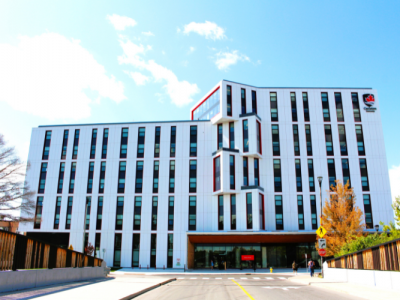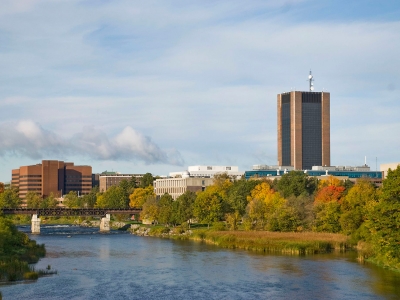With lockdown measures easing across the country, new research shows that Canadians are worried about the potential public health consequences of reopening the economy.
In a survey of 2,000 Canadians, researchers from Carleton University asked whether governments should prioritize economic recovery now or continue with current public health measures designed to flatten the curve of new COVID—19 infections.
The research reports that a strong majority of Canadians (79 per cent) agreed with the statement: “It is more important to minimize avoidable illness and death than to reopen the economy too quickly,” while 21 per cent expressed a preference for “getting the economy going again, even if that leads to more illness and death.”
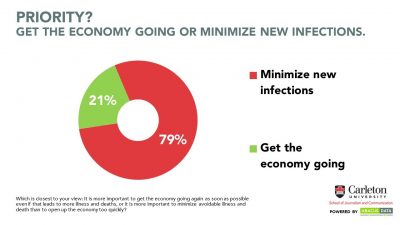
The survey tested for gender, age, regional and large city differences, along with levels of educational attainment and political party affiliation, finding that men are 25 per cent more likely than women to prioritize economic recovery over continued protection of public health (24 per cent compared to 18 per cent), while older Canadians are most worried about the health risks of opening the economy too soon (89 per cent of Canadians aged 60 and over felt it was most important to minimize risk of infections over economic recovery compared to only 72 per cent of Canadians aged 18 to29).
The strongest levels of support for reopening the economy now were found in Saskatchewan and Manitoba (31 per cent and 29 per cent), while those in the Maritime provinces were most likely to support continuing with current measures to minimize rates of new infection. Those living in Canada’s largest cities were consistent in their views on minimizing infections versus getting the economy going.
Differences across education levels were not statistically meaningful.
There was no real difference in views by community type. About eight in 10 respondents living in urban, suburban or rural communities prioritize minimizing new infections over getting the economy going.
Although voters from all parties supported the need for maintaining current public health measures over reopening the economy, the strength of support was weakest among voters who supported The People’s Party of Canada and Conservative Party (45 per cent and 72 per cent, compared to between 86 and89 per cent among Liberal, NDP, Green and Bloc voters).
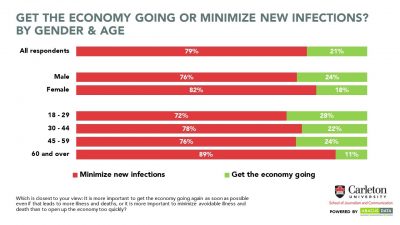
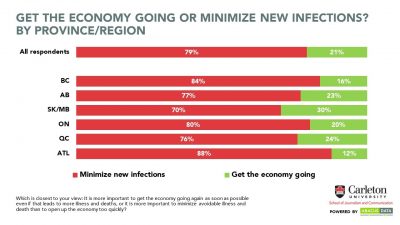
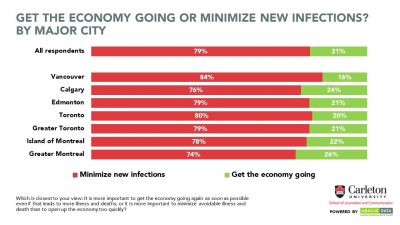
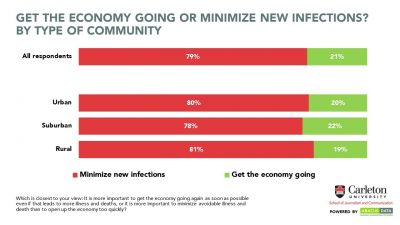
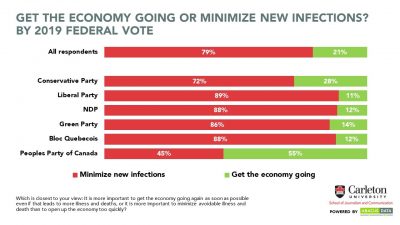
According to Josh Greenberg, a professor in the School of Journalism and Communication and one of the project co-investigators, the research offers an important perspective on the state of public worry at a time of continued pandemic threat.
“Our findings suggest that Canadians have no appetite for moving quickly and want their leaders in government, the health sector and business to move with an abundance of caution,” he says. Greenberg notes that media coverage of anti-lockdown protests outside some provincial legislatures presents a “distorted view of public enthusiasm” for putting economic recovery efforts ahead of public health measures, and notes that provincial leaders who are reopening their economies now will have to continue making sure that “efforts to protect public health remain front and centre in their decision-making.”
The researchers also asked respondents to report who they most trusted to provide accurate and timely information about the risk posed by COVID—19, how quickly decisions should be made about easing current public health measures, including school closures, safe distancing policies and the suspension of non-essential work, and who should be responsible for determining when such reopening decisions should be made.
The research shows that public health officials and medical professionals are by far the most trusted sources of information about the risks of COVID—19, followed by academic and scientists.
Canadians expressed strong levels of satisfaction overall with the performance of elected officials at all levels of government, but they also agreed that the most acceptable timeline for reopening should occur only after health officials determined that the risk to the public was sufficiently low.
Only seven per cent of Canadians felt that public health restrictions should be immediately suspended, and an additional 11 per cent wanted this to occur “within the next two weeks.” More than 70 per cent agreed that public health measures should be lifted only once public health officials determine it is safe to do so. Eighty per cent of respondents believe that “ultimate authority” for making a decision about when to reopen the economy should rest with public health officials, while six percent felt that this decision should be made by politicians.
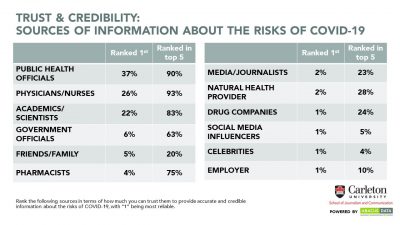
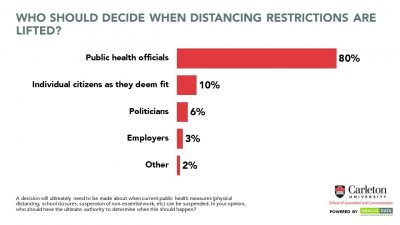
According to Greenberg, the biggest lesson for politicians who are keen to restart their economies is to take the time to get it right, and to continue following the guidance of public health officials.
“Until testing and contact tracing regimes are operating at higher levels of capacity, we need Canadians to continue cooperating and moving in the same direction,” he says. “We also need our elected officials to continue demonstrating their faith in science, and to continue letting public health officials speak directly to Canadians. If we change course too soon, we run the risk of going through this exhausting exercise all over again in a few months.”
The public opinion survey is a project of the School of Journalism and Communication at Carleton University, funded by its Faculty of Public Affairs and supported by Abacus Data. A second phase of the survey will be conducted in early June, with a comprehensive report to follow.
The first phase of the survey was conducted with 2,000 Canadian residents from May 5 to8, 2020. The margin of error for a comparable probability-based random sample of the same size is +/- 2.19%, 19 times out of 20.
The data were weighted according to census data to ensure that the sample matched Canada’s population according to age, gender, educational attainment and region. Totals may not add up to 100 due to rounding.
For more information:
Josh Greenberg, PhD
Professor
School of Journalism & Communication
Carleton University
Joshua.Greenberg@carleton.ca
Christopher Waddell, Ph.D.
Professor
Program Director
Bachelor of Media Production and Design
School of Journalism and Communication
chris.waddell@carleton.ca
Tuesday, May 19, 2020 in News Releases
Share: Twitter, Facebook

